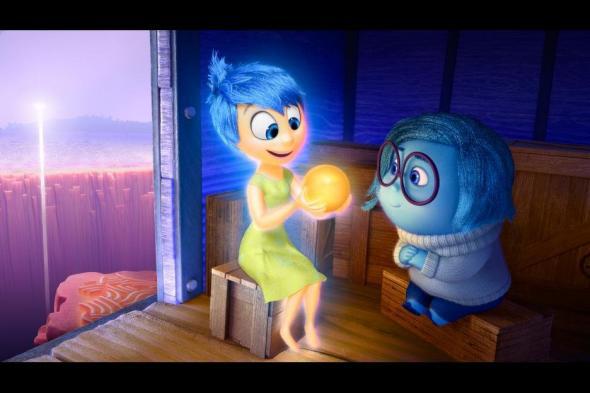Audible weeping could be heard all around me over the weekend at Pixar’s new movie Inside Out, which has received high praise as an intellectually interesting caper and an honest, ultimately optimistic exploration of the loss of childhood innocence. For plenty of adults, Inside Out will represent a moment of catharsis as they remember their own transitions into the more subtle and nuanced emotions of adulthood.
While the movie’s themes are universal, Pixar has also worked in a subtle but surprisingly feminist theme about how girls are raised. When we first peek inside the head of 11-year-old Riley (voiced by Kaitlyn Dias), she is a generally happy child whose emotions are ruled by Joy (Amy Poehler), who stands taller and speaks more forcefully than the other four emotions. This is how it should be, the movie suggests: Riley is an inherently cheerful girl with a pretty easy life.
When Riley’s family moves, however, other emotions—Fear and Sadness—start grabbing at the controls. Most of the movie is dedicated to Joy learning to give up some control and accept that Riley doesn’t need to be happy all the time to be OK. But when the camera pops out of Riley’s head and into her world, we see that this pressure to be happy all the time isn’t completely self-imposed. At separate times, both of Riley’s parents (played by Kyle MacLachlan and Diane Lane) ask Riley to be the happy little girl they’re used to. They’re clearly well-meaning, but they’re guilt-tripping their kid. (The scenario echoes a 1990 Simpsons episode in which sweet Marge Simpson implores a down-in-the-dumps Lisa to “take all your bad feelings and push them down, all the way down past your knees, until you’re almost walking on them.”)
Of course, we all have to suppress negative feelings for the sake of social harmony, but girls experience a lot more pressure to be pleasant and cheery for the benefit of others. “This sounds a lot like the beginning of gender conditioning,” writes Flavorwire’s Sarah Seltzer, pointing out how Riley is made to feel as though “her family relies on her being their happy girl.”
But Riley’s mom and dad aren’t demonized for putting these subtly gendered expectations on their daughter. On the contrary, their appeals are so effective because they’re not only loving parents but also professional, liberal San Francisco types who push their girl to be in sports. They do learn to give Riley a little more space to be a pouty preteen, and the implication is clear: We are all capable of falling into these gendered traps. The only thing to do is forgive yourself and try to do better next time. (Marge Simpson came around, too; she apologizes to Lisa and says, “Always be yourself. If you want to be sad, honey, be sad. We’ll ride it out with you.”)
Feminist themes are trendy right now in pop culture. Frequently, they’re laid out in broad strokes with easy heroes and easy (sexist) villains, in movies as diverse as Frozen and Mad Max: Fury Road. I enjoy a fantasy of girl power conquering menacing patriarchal creeps as much as the next gal. But I was also refreshed by Inside Out’s subtle, villain-free narrative about a girl overcoming some pernicious but subtle gender training to find a truer version of herself.
